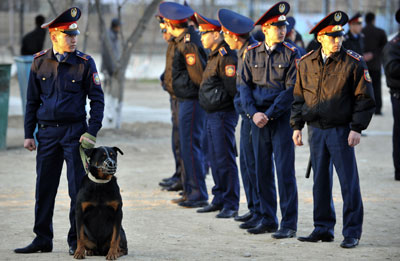In a reply to CPJ’s protest letter regarding the politicized imprisonment of journalist Igor Vinyavsky, Kazakhstan’s General Prosecutor’s Office said the prosecution wasn’t retaliatory nor related to his journalism. CPJ publicly appealed to Kazakh President Nursultan Nazarbayev after his country’s security service, the KNB, raided Vinyavsky’s newsroom and apartment, confiscated reporting equipment, and imprisoned the journalist for two months. The KNB also harassed and interrogated Vinyavsky’s family and local journalists who protested against his incarceration.
“I need to inform you that the media representatives’ opinion that Vinyavsky was prosecuted in retaliation for his reporting on Zhanaozen events is incorrect because the criminal case against him was not at all related to his journalism,” A. Ogai of the General Prosecutor’s office wrote in the official response to CPJ.
CPJ research shows that the most recent media crackdown in Kazakhstan stemmed from critical coverage of deadly clashes between police and oil workers in the western town of Zhanaozen on December 16, 2011. After at least 15 people died in the clashes, authorities blocked local access to independent news websites and Twitter, shut down mobile phone networks, and detained journalists.
According to Ogai, Vinyavsky was jailed because he posed a threat to national security and planned to overthrow Kazakhstan’s constitutional order. The plot, however, did not involve training revolutionary forces nor staging a coup-d’état backed by local army generals.
Vinyavsky’s instrument of crime, according to Ogai, was a leaflet — a piece of paper, which the local press said the police had taken from men they detained in 2010. The KNB said he had authored the leaflet, even though the indictment against him, published by the embattled Almaty-based newspaper Respublika, did not list Vinyavsky among the men who reportedly possessed it. And yes, it took the KNB a full two years to uncover this threatening plot.
Ogai said the leaflet was put through a “psychological -philological analysis conducted with the participation of a political analyst,” who declared that it “contained characteristics of undermining the national security of Kazakhstan, violent seizure and retention of [political] power, and change of the constitutional regime.”
If readers wonder what the leaflet said, here’s its text: “”Kyrgyzstan got rid of the robbing family of [ousted President Kurmanbek] Bakiyev. Enough tolerating, take [Nazarbayev] to the dumpster!” It also carried Nazarbayev’s picture, the indictment said.
Ogai ventured to assure CPJ, after the KNB jailed the editor on a pretrial basis and harassed his colleagues, that authorities “granted Vinyavsky his rights of defense, presentation of testimony, and exculpatory evidence, as well as his right to receive qualified legal assistance.”
Following protests by CPJ and other groups, the KNB released Vinyavksy in March. Ogai said the journalist had admitted to committing the crime, and asked to be released on amnesty. Only Vinyavsky can say whether he authored that leaflet–neither Ogai nor the KNB presented CPJ or the public with any credible evidence implicating the journalist. And KNB prison could probably force anyone to confess a crime in exchange for freedom, but that’s another topic.
What’s more important is whether Kazakh authorities, including the KNB and the General Prosecutor’s Office, are capable of solving real, not imaginary, crimes–like brutal attacks against critical journalists. Press freedom is a pillar of democracy, and both are endangered in Kazakhstan.
